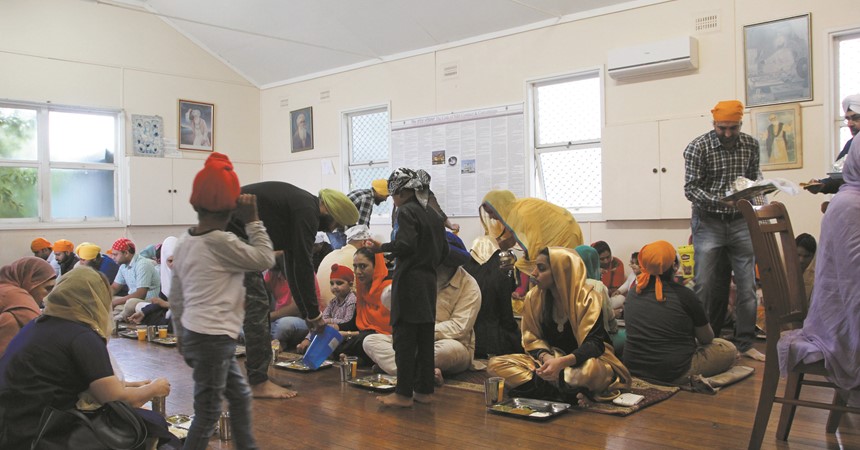The Sikh Gurus were blessed with the wisdom of Akal Purakh (Waheguru), the Divine One God, and the Supreme Creator. Guru Nanak Dev Ji coined a new two-letter word − Ik Onkar − in which the first letter is the numerical figure of ‘one’, while ‘onka’ means the Supreme Creator, present everywhere and within everyone. The Supreme Creator is Eternal Truth, the doer of everything, without fear and without animosity. His form is immortal, beyond birth and death. He is unborn and self-illuminated. He is realised through the grace of the Guru.
Sikhs believe that God is experienced through love, worship and contemplation. They look for God inside their own hearts and souls and outside in the creation of the universe. “The One (Akal Purakh) who pervades the universe also dwells in the body; whoever seeks Him, finds Him there.” (Guru Granth Sahib, page 695). Just as the fragrance in the flower, and reflection in the mirror, God is within you.
The wisdom and teachings of Sikh Gurus and contemporary Saints (Sufis, Hindus and Muslims) with similar faith in the Supreme Creator, are compiled in the holy scripture of Sikhs, called Guru Granth Sahib. Sikhs believe that the verses of Guru Granth Sahib are the revealed words of the Supreme Being. “As the word of the Master comes to me, so do I make it known” (Guru Granth Sahib, page 722). The tenth Guru Gobind Singh declared that there would be no other living Guru after his demise, but instead Sikhs should look to their holy scripture for guidance. So Guru Granth Sahib is the permanent, unchangeable guide for all faithful Sikhs, for whom it has the status of a living guru or Teacher.
Sikh spirituality is centred on the need to understand and experience God, and eventually become one with Him. Of all forms of life, human form is the ultimate form. Only in this form can one achieve the real purpose of being born − to become one with Him. “Having received this human body, it is your turn to unite with the God, the Protector and Lord of Universe.” (Guru Granth Sahib page 12).
Three prime Sikh teachings are:
- “Naam Japna”: Meditating on God’s Name (Waheguru) and keeping Him in your heart and mind at all times.
- “Kirt Karna”: Earning an honest living. Truth is the highest of all virtues, but higher still is truthful living. (Guru Granth Sahib page 65).
- “Vand Chhakna”: Living as an inspiration and a support to others, giving to charity and caring for others. A Sikh is expected to contribute at least 10% of his/her income to charity.
To be closer to God, Sikhs try to avoid the five vices − Lust, Covetousness and Greed, Attachment to things of this world, Anger and Pride − that make one self-centred and deviate the focus from the real purpose of ‘to become with Him’.
According to Sikh philosophy, all humans are equal before God. The principles of universal equality and brotherhood are important pillars of Sikhism. No discrimination is allowed on the basis of caste, race, gender, creed, origin, colour, education, status or wealth. Women have the same status as men. They can lead a prayer service and take part in all religious ceremonies including baptising. Sikh women are encouraged to be educated, have careers and become community leaders.
Running a free community kitchen, Langar Sewa, is a part of Sikh faith. Sikhs run a community kitchen in a Gurdwara where a meal is served to all, without distinction. Everyone sits together and shares a meal which reinforces equality. A free community kitchen service is run at Golden Temple Amritsar (Punjab, India), where some 85,000 people visit every day and share a meal. This concept is spreading to the streets, to serve the underprivileged and those in need.
Like other minorities, Sikhs are facing challenges for survival. Violent incidents against Sikhs in different parts of the world are alarming and present a danger to the community. The distinctive personality of Sikhs, with long and unshorn hair (Keshas) covered by a turban, is being misunderstood and they are sometimes incorrectly associated with terrorist groups operating in the world. Sikhs are facing the challenge of convincing people that they are not terrorists, but a peace-loving community with high moral values. Sikhs are presenting enormous contributions to the world. The Sikh Philosophy and tradition is at the forefront of social innovation. Intrinsically, the future seems bright.
The Sikh community within the Newcastle, Hunter and Maitland areas meets every Sunday at Shortland Gurdwara, 27-29 Marton Street, for prayer from 11am-1pm. Everyone is welcome to witness the proceedings and share food cooked in the free Community Kitchen.




























































































